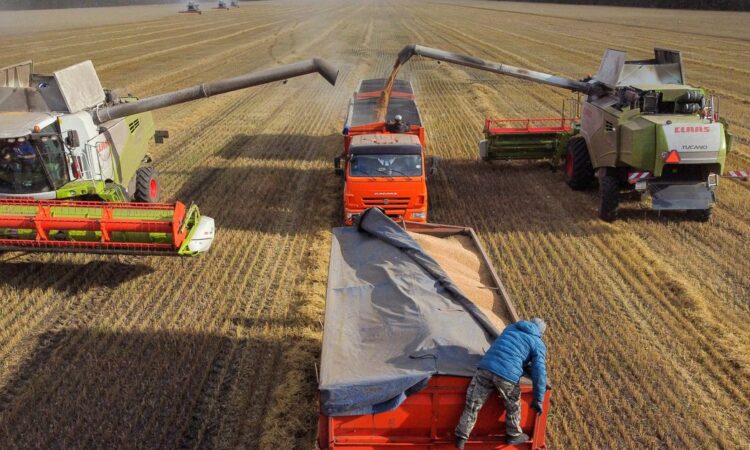
[1/3] Agricultural workers operate combines and trucks in a field during wheat harvesting near the village of Solyanoye in the Omsk region, Russia September 8, 2022. REUTERS/Alexey Malgavko
UNITED NATIONS, May 24 (Reuters) – The United Nations is working with the African Export-Import Bank (Afreximbank) to create a platform to help process transactions for Russian exports of grain and fertilizer to Africa, the top U.N. trade official told Reuters on Wednesday.
An agreement struck in July last year requires the U.N. to help Russia overcome any obstacles to its grain and fertilizer exports for three years. It was reached at the same time as a deal allowing the safe Black Sea export of food and fertilizer from Ukraine following Russia’s February 2022 invasion.
The deals were intended to ease a global good crisis that the United Nations said was worsened by the war because both countries produce grain and fertilizer for world markets, particularly in Africa and the Middle East.
“We have not turned the corner on this,” Rebeca Grynspan, who leads the implementation of the U.N. deal with Russia, said in an interview, describing the Black Sea accord and pact between the U.N. and Russia as continuing to “be a life line for food security” around the world.
The Black Sea deal was extended last week for the third time after Russia agreed to a further two months. But Moscow has been threatening to quit unless a list of demands to improve its own food and fertilizer exports is met.
‘AGILE TRANSACTIONS’
Russia’s agricultural exports are not subject to Western sanctions imposed over the invasion of Ukraine, but Moscow says there are restrictions on payments, logistics and insurance and a wider chilling effect from the measures. The United States and others have dismissed Russia’s complaints.
Grynspan said she was working with Afreximbank to try to help small and medium-sized countries in Africa combat disrupted trading and access Russian grain and fertilizer through “more agile transactions.”
“We are working with them (Afreximbank) and making a platform that will allow for a more agile due diligence with the clients to comply with the sanctions, but allow for the transactions of food and fertilizers with Africa,” she said.
Cairo-based Afreximbank was not immediately available for comment. Grynspan did not share any further details as discussions continue.
Russia’s agricultural bank, known as Rosselkhozbank, was cut off from the SWIFT international payment network by the European Union in June. Russia wants it reconnected, but the EU has said it was not considering reinstatement of Russian banks.
As an alternative, U.S. bank JPMorgan Chase & Co has processed some Russian grain export payments, sources told Reuters last month, and could process dozens more. But Russia has dismissed this as unsuitable in the longer term.
Some 260,000 metric tonnes of Russian fertilizer has also been stuck in several European ports. Moscow said the fertilizer would be donated to countries in need.
The United Nations helped arrange for the release of the first two shipments, to Malawi and Kenya. A delivery was also planned for Nigeria and possibly Sri Lanka and South Africa, Grynspan said.
Reporting by Michelle Nichols; editing by Grant McCool
Our Standards: The Thomson Reuters Trust Principles.





